Mice, Airstream–and Now Hantavirus?
©Bert Gildart: I’ve received a number of e-mails regarding my post on mice in our Airstream (see & see ), some from family members explaining that mice are dangerous “they carry Hantavirus, don’t you know,” and then kind statements from loves ones such as: “your elevator isn’t going to the top floor.”
Perhaps I am too cavalier about mice, but that attitude derives from years of exposure to mice and pack rat droppings in cabins throughout Glacier, where I worked as a ranger. Remote snowshoe cabins and ranger stations can be musty places, prime attractors of microtids, and over the many years I have cleaned up piles and piles of mice and packrat turds. I’m still here and don’t recall any down days following even extended stays. Of course, back in those days I didn’t know I should have been worried.
I never heard the word Hantavirus until about a decade ago, and then suddenly the disease became endemic. Native Americans in the Southwest had apparently contracted it, but that didn’t appear to be something that should concern me. But several years ago a death occurred here in Montana near Glacier National Park. The assistant superintendent had been cleaning out the barn (on a recently purchased piece of property, I believe), which apparently was full of mice dropping. Several days later he fell ill and, then, several days after that he died, apparently from Hantavirus.
With those thoughts in mind and with all the concern expressed by a number of people about mice I did a little research and here’s what I’ve learned about Hantavirus and how to deal with it.
Hantavirus was discovered in 1993 and since that time doctors have reported a total of 465 cases. Reports continue saying that 35% of those cases [that's 161] have resulted in death. Symptoms cropped up soon after exposure and always seem to include fatigue, fever and muscle aches, especially in the large muscle groups-thighs, hips, back, and sometimes shoulders. In other words, it can be like flu.
Infection occurs most commonly through the inhalation of saliva or excreta. “Transmission,” reports say, “occurs when dried materials contaminated by rodent excreta are disturbed and inhaled.” Reports also say that persons have acquired Hantavirus after being bitten by rodents, and (and this part is for my son-in-law, Will, who intends to convert an old barn into a rec area) “from cleaning rodent-infested structures.”
What to do under such circumstances? “Wear a surgeon’s mask,” says yet another report.
Unfortunately, the culprit in the transmission of this disease is directly linked to the deer mouse, the “Pero” of my last week’s posting. However, research has shown that only about 10% of deer mice tested showed evidence of infection.
In other words, am I going to worry about dropping in our Airstream–and should Janie or I have worn face masks when cleaning the relatively small amounts of mouse droppings? I don’t think so. But are we going to sanitize areas where we’ve found droppings? Certainly, and I hope we get all those little droppings.
But I’m not going to loose sleep, either, about anything we might have missed.

